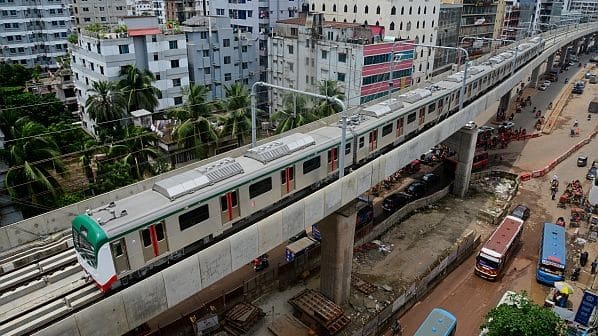CONSTRUCTION work on Dhaka MRT Line 1, the first underground metro line to be built in Bangladesh, was inaugurated on February 2 by the country’s prime minister, Ms Sheikh Hasina, at Purbachal in the project’s sector 4.
Back in October 2022, when the contract for overseeing the works was signed with a joint venture led by Nippon Koei, the start of construction was scheduled for December but had to be pushed back to the start of February.
The Taka 525.6bn ($US 5.2bn) project, said to be the biggest infrastructure project in the Bangladeshi transport sector, will comprise a 19.87km underground main section from Hazrat Shahjalal International Airport to Kamalapur railway station, and an 11.36km branch from Natun Bazar to Purbachal Terminal that will be mainly elevated.
Taka 131.1bn of the project cost is to be provided by the Bangladesh government while the Japan International Cooperation Agency (Jica) will provide Taka 394.5bn as a soft loan under an agreement signed in July 2022.
Dhaka Mass Transit Company (DMTCL) managing director, Mr M A N Siddique, has pledged that the project will be completed by the end of 2026.
Siddique says that when Line 1 is completed, journeys from the airport to Kamalapur will take just over 24 minutes, including stops at 12 stations, while those from Natun Bazar to Purbachal will take around 20 minutes, with stops at seven stations.
He adds that Natun Bazar will be an interchange station between both sections of MRT Line 1 and MRT Line 5’s Northern Route, which is due to open in 2028.
“A total of six metro rail routes will be inaugurated in the capital city Dhaka by 2030,” Siddique says. This includes the second phase of Line 6, due to open this year, and Line 2 which is due to open in 2030. Line 4 is also scheduled to open in 2030, while the Northern Route of Line 5 is expected to open in 2028 and the Southern Route in 2030.
The first phase of MRT Line 6, Bangladesh’s first metro line, opened on December 28 2022, with 3857 passengers using it during the first day of operation.
For detailed data on metro projects in Asia and around the world, subscribe to IRJ Pro.

